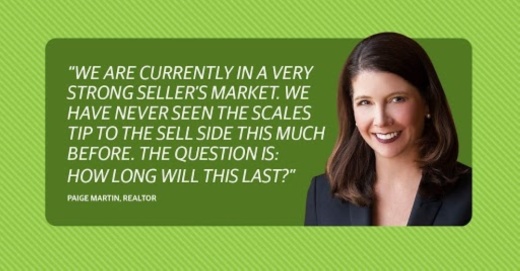Since you started working in the Houston real estate market in 2004, what changes have you observed?
The internet is having a huge impact on how people buy and sell homes. Ten to 15 years ago, we relied on agents and brokers, open houses, brochures and flyers, and other traditional media. This year, 97% of buyers used the internet to search for homes. COVID-19 has spurred the shift even further where it has become common for buyers to depend more on virtual tours and online listings and for sellers to understand its value.
With resources readily available, this trend is creating a wave of well-informed buyers and smart sellers. We see them going to more-established agents with a good track record and strong online presence.
Economic factors and political climate will always have an impact, but we have more than enough data we can use to properly project how the market will behave during both bearish and bullish periods.
The internet has changed the entire landscape and will continue to shape the industry moving forward.
How would you describe the current real estate market? What trends are you currently seeing?
Obviously, we are currently in a very strong seller’s market. We have never seen the scales tip to the sell side this much before. The question is: How long will this last?
COVID-19 and subsequent government actions have dumped gasoline on wealth inequality in ways that we do not fully understand yet. This is creating a “tale of two cities” both locally and nationally.
Also because of the lockdown last year, homes now have a higher “intrinsic value” to people because of the extended time they spent in their abode. This implies that many families will allocate a higher percentage of their total net worth to making their home their haven moving forward.
The downside to the market moving this fast is that a lot of homebuyers are putting their search on hold, regardless of their motivation to move. When you have properties, good or bad, selling in a matter of days, it creates competition that may put some buyers at a disadvantage. This implies we may be in for a slowdown soon.
What factors are contributing to the current market?
Aside from above, the biggest factor is how much surplus cash the average American has these days. Despite the pandemic, 2020 was the best year in American history for personal income. While many people did lose their jobs—the average American’s private wages, salaries and average hourly earnings are back at new highs. From March to November of 2020, Americans made $1 million more than they did from March to November of 2019.
In addition, mortgage rates are at an all-time low. Some companies are offering 30-year fixed-rate mortgages for less than 2.3%.
Put another way, the monthly payments on a $500,000 mortgage are about the same as a $210,000 mortgage from the mid-1990s or a $300,000 mortgage from 2007.
Add all of that to the growing fear of hyperinflation, and we can see why most Americans are opting to spend money on real estate versus keeping it in the bank or in stocks.
What do you think are the long-term effects of the current market?
Specific neighborhoods with above-average income zoned to good schools that have historically been good stores of wealth will perform very well. This is because buyers have money to spend for down payments, benefit from the lowest interest rates ever and want real estate to serve as a hedge in their portfolio.
We are watching the return-to-work phenomenon closely. Nearly 9 out of 10 workers want to work from home a few days a week. Historically, proximity to major job centers has driven land value. We believe employers will be more flexible to “work at home” as it is a way to offload costs and improve employees’ work-life balance.
We believe that specific closed-in neighborhoods characterized by high poverty with high income diversity—where gentrification has started taking place—will appreciate greatly because there are investors with cash looking to diversify out of the stock market. We are already seeing this. They have access to down payments and cheap rates, and these areas have many residents who do not have that access—so they will continue to need to rent, perpetuating a cycle of economic inequality. We believe a large part of the appreciation here will be driven based on government action.
We believe these trends will create limited appreciation for Inner Loop neighborhoods known for small lots, choppy floor plans, especially zoned to not-top-ranked schools.
What are the benefits of currently buying or selling a home?
We try to avoid giving a blanket statement for just buyers and sellers. The Houston market is hyperlocal.
Especially given the current market, the smartest move is to zoom in and break down the data and trends based on the specific area, property type and price range.
In our latest study of Houston’s housing segments, we see some sectors where the buyers are still winning despite the general market leaning heavily toward sellers.
Looking at absorption rates, or how many months it will take to sell out the current supply of homes available based upon the current rate of sales, luxury townhome and condo buyers are well positioned to get good deals. On the flip side, those looking to sell single-family homes—especially those priced within the $500,000-$1 million range—should have a leg up during their negotiations.




